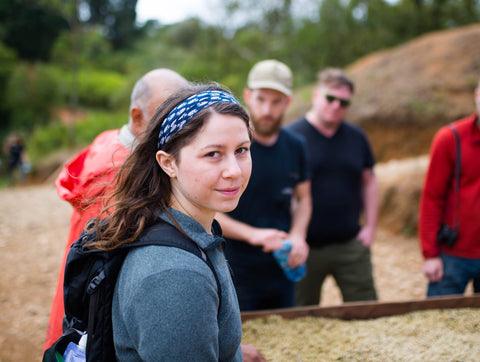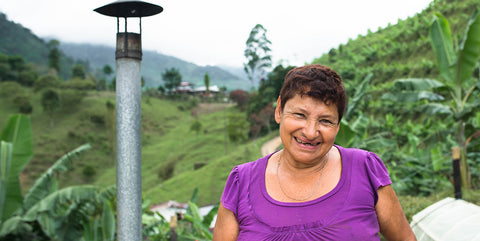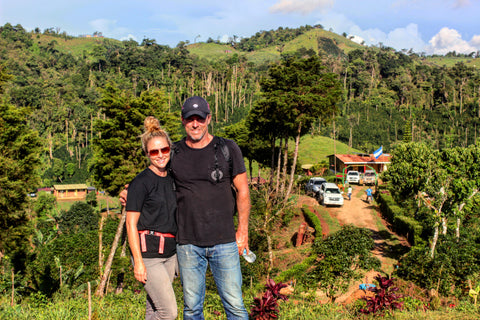This past January 2017 I traveled to Nicaragua with Blanchard’s Coffee Roasting Co. to visit a coffee farm called Finca San Jose de las Nubes located in the cloud-capped mountains outside the city of Matagalpa in the Jinotega region. All the planning, reading, and photos I took in couldn’t prepare me for the shift in cultural norms I would experience in what is one of the most impoverished countries in Central America. I encountered women and children working long hours amid crushing poverty, and I knew I wanted to help make a difference and tell their story as best as I could.
Women in coffee production have long been an invisible workforce, especially in Central America. Seventy percent of the physical labor on small coffee farms is carried out by women, however the decision making and community leadership is almost always carried out by men. Women rarely own land and more rarely do they have access to credit or control of finances, echoing a pervasive patriarchal culture in Nicaragua where women fulfill domestic roles such as caring for the house and children while still working physically demanding jobs for low pay.

Throughout every stage of coffee production, whether it be commodity or speciality, women till the soil, pick coffee cherries, prune trees, haul coffee in heavily mountainous regions to be processed, and sort beans for defects. Because women are so heavily represented at this level of the coffee supply chain, gender inequality remains one of the most disturbing attributes of coffee’s industrialized structure in the region.
Despite undertaking seventy percent of the physical labor burden, women in Nicaragua own only twenty-three percent of the land. In an effort to address this, cooperative organizations such as Soppexca, based in Nicaragua, and global organizations like the International Women's Coffee Alliance are working towards narrowing the gender gap by helping women buy their own land, creating opportunities for meaningful work and agency in their own future and that of their families.
Soppexcca is a Nicaraguan coffee cooperative that seeks to empower women and promote gender equality among members of the community through the education, inclusion, and professional development of it’s cooperative members. Located in the northern department of Jinotega, Soppexcca has grown to 650 members, 210 of them are women producing 825 tons of coffee each year.
The International Women’s Coffee Alliance operates throughout coffee growing regions worldwide and is focused on empowering women to achieve meaningful and sustainable lives. The IWCA acknowledges that developing women in coffee producing roles is essential to bringing resources and finances back to the coffee communities themselves. Several coffee growing counties such as Colombia have women involved at all stages of coffee production. In Colombia, 47 percent of the National Federation of Colombian Coffee Growers are women, and one fifth of all the country’s farms are owned and operated by women.

Women on coffee farms and dry mills across the globe are stepping into leadership roles, finding answers to the problems that exist within their community in the pursuit of quality coffee. One such example of this is a coffee recently sourced by Blanchard’s, an award winning Colombian microlot from a farm called El Nogal. Noralba Velandia operates the small coffee farm as a single mother of two teenage children who also help harvest and process the farm’s production. Her farm of 10,000 trees started as a small one room house built by the Colombian Government as part of a nation-wide act to establish a sustainable and financially secure resource for families in need. In the twenty years Norabla and her family have lived on the land, they have added on to the one room house and expanded their operation to include a retractable roof-top drying bed that allows coffee to sun-dry when possible, and protects it when frequent rain hits the mountain. She works hard to provide a good life for her family by negotiating with buyers to get the best possible price for her coffee as well as those of her family and neighbors.
Nicaragua’s Finca San Jose is also breaking the mold by employing twenty-three year old Mayela Garcia Reyes as Farm Manager to run operations on the 27.26 hectare (67.35 acres) farm. Finca San Jose owners, brothers Alvaro and Bayardo Reyes hired Mayela after the former manager left his position on the farm. Bayardo attributes the lasting impression that working alongside strong and compassionate women in the United States Army as one of his reasons for wanting to hire Mayela to manage their farm in Nicaragua. After living in the United States and then returning to Nicaragua, he has said that he specifically wanted to hire a female manager to break down gender inequalities within the rural community the farm would be serving.

To better understand Nicaragua as a whole, it is important to keep in context that the country has been engulfed in civil war, and suffering from natural disasters for much of the past 50 years. Nicaraguans were often displaced by conflict, victims to crippling poverty, or both, and only recently has the country made significant progress in rebuilding its economy which is closely tied to agriculture. When Bayardo and his brother Alvaro were young, they were exiled to the United States. Fleeing their family’s estate, they assimilated into life in the United States, living with family and earning college degrees. Bayardo joined the United States Army as a Civil Engineer and Alvaro worked odd jobs returning to Nicaragua in the late 90’s. A major result of the Nicaraguan Revolution of the 1960’s and 70’s was agrarian reform, or government-backed agricultural land redistribution. Under this policy, the Reyes multigenerational family estate was dissolved, but once the Reyes brothers returned to their home country of Nicaragua, the desire to reconnect with the agricultural traditions their family had practiced for generations, specifically growing coffee, had overcome them both. Bayardo purchased a section of land in the coffee growing region tucked up high in the cloud capped rainforests outside Matagalpa and named it San Jose de las Nubes in memory of their family’s historical estate.
At twenty-three years old, Mayela was raised in the rural Nicaraguan countryside La Tuma Dalia, just an hour drive from Finca San Jose. In Nicaragua, formal education is hard attain due to a broken public school system and suffering negative consequences of the government's socialist regime. She rightfully boasts about her multiple Coffee Agriculture degrees from Nicaragua’s National Institute of Technology. She strived, even at a young age, to pursue a future career in agriculture.
“No me gustaba jugar con muñecas. Mi diversión era sembrar flores y cortar madera con un machete. En ese tiempo, mi papá cultivaba café y yo recolectaba el fruto”
“I did not like to play with dolls. My fun was to plant flowers and cut wood with a machete. At that time, my father grew coffee and I collected the fruit.”
Mayela notes that there are challenges to overcome as a woman leading a usually male dominated farm, having to prove her worth by working long hours in the fields every day with the other workers.
“Para la finca, mi visión es tratar siempre de tratar a los trabajadores bien - y para todo lo que hago - para ir bien. Y, también, para la producción, no es cantidad, es calidad. Espero que...Que los trabajadores sientan alivio con las condiciones en las que estamos creando para ellos y para que se sientan cómodos. Igualmente, que podemos ofrecer, más adelante, tantas materias primas como podamos a los trabajadores.”
“For the farm, my vision is to always try to treat the workers well--and for everything that I do to go well. And, also, for production, it’s not quantity, it’s quality. I hope that . . . that the workers feel relief with the conditions in which we are creating for them and for them to be comfortable. Equally, that we can offer, later, as many commodities as we can to the workers.”
With the support of Bayardo and Alvaro, Mayela has been able to bring conveniences and comfort to the workers on the farm that have often been overlooked by male predecessors. Medical treatment is scarce in the mountain community, with the closest hospital over an hour away down the rough and sometimes impassable mountain roads. She organizes weekly trips from the farm to the local clinic for any worker at San Jose who needs medications or treatment. Each year she ensures that school supplies are provided for the 73 children whose families are involved with the farm and surrounding community. Mayela attributes her success to the support of her family and recognizes the importance of education which prompted her educational vision for the farm. She took notice that 23 children were not attending school, in most cases because the school was just too far away and the parents did not have time to walk with their children to school each day. She proposed that they begin construction of a schoolhouse at San Jose for the children and parents who work on the farm. In March 2017, workers at San Jose broke ground on the construction of the school and completed the project in June 2017. Bayardo and Alvaro pay an extra stipend for the teacher which attracted a talented and passionate educator to run the school. With the addition of the schoolhouse at San Jose, the workers have an added sense of job security and belonging. People want to work at San Jose as opposed to more traditional coffee farms because they know that both they and their families will be taken care of. The schoolhouse can also be used as a community gathering place where church service and birthday parties can be held which is something they didn’t have before. Having a school on the farm allows Mayela and the Reyes brothers to shape the creativity and individuality of children at a young age.

In a few short days I will fly to Nicaragua with Blanchard’s Coffee to visit San Jose de las Nubes a second time. Our group has a full agenda of small projects we wish to complete on the farm this visit - from arts and crafts projects with the children to the application of fluoride treatments for children who haven’t had access to regular dental care.
Since my initial visit in January, I have been in almost daily contact with Mayela. We talk on WhatsApp (a free, internationally available texting app) about family, music, art, and compare what makes our lives both similar and also very different. Sometimes she’ll ask me to send her pictures of what kind of cars we drive in the states, what do the trees look like, what do the houses look like. In some ways we are very much alike - she and I are both in leadership roles in a primarily male dominated field - and we both see how special our friendship has become.
Getting to know Mayela has motivated me to pursue a calling of advocacy on behalf of my local community and that of San Jose. Most projects that Blanchard’s Coffee has invested in at San Jose can be attributed to Mayela. Through her ideas she continues to improve the lives of the farm workers and surrounding community. Without her attention to detail and organization, most of the initiatives implemented on the farm over the past few years would not have so easily come to fruition.
With Mayela creating change in their community, the boys and girls of Finca San Jose will grow up with the opportunity to be creative individuals and see women as leaders that they can be proud of. With the support of the Reyes brothers, and Blanchard’s Coffee Roasting Co., Mayela is working to find answers to the problems that exist within her community. I am proud to call her my friend and support her every effort along the way to equality and prosperity, and I look forward to continuing to share the story of her journey.
Continue Reading: Creating Change: Women in Coffee Pt. 2
Words by Tamara South
Photographs by Cameron Lewis





